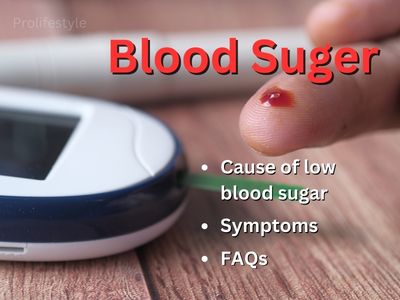
Blood sugar, also known as blood glucose, refers to the concentration of glucose (a type of sugar) present in the bloodstream. It serves as the primary source of energy for cells and tissues. Maintaining blood sugar levels within a normal range is crucial for overall health, as imbalances can lead to complications like diabetes. After eating, blood sugar levels rise, stimulating insulin release to regulate glucose uptake by cells. Between meals, blood sugar decreases, and stored glucose is released. Monitoring and managing blood sugar levels through a balanced diet, exercise, and, if necessary, medication are vital for optimal health and preventing related health issues.
For fasting blood sugar (when you haven’t eaten for at least 8 hours), the normal range is typically :
– 70-99 mg/dL (3.9-5.5 mmol/L)
For blood sugar levels 2 hours after eating (postprandial), the normal range is usually :
– Less than 140 mg/dL (7.8 mmol/L)
Main cause of low blood sugar
Low blood sugar, also known as hypoglycemia, occurs when the glucose level in the blood drops below the normal range (typically below 70 mg/dL or 3.9 mmol/L).
There are several factors can cause low blood sugar :
- Medications for Diabetes : Taking too much insulin or other medications prescribed for diabetes can cause a sudden drop in blood sugar levels.
- Delayed or Missed Meals : Skipping meals or delaying meals for an extended period can lead to low blood sugar, especially in individuals with diabetes or those with poor eating habits.
- Excessive Physical Activity : Engaging in intense physical activity without adjusting food intake or insulin dosage can cause hypoglycemia, particularly in people with diabetes.
- Alcohol Consumption : Drinking alcohol without eating enough food or drinking in excess can lower blood sugar levels.
- Certain Medical Conditions : Some medical conditions, such as insulinoma (a tumor in the pancreas), liver disease, kidney disorders, and certain hormone deficiencies, can lead to low blood sugar.
- Gastric Surgery : People who have undergone gastric bypass surgery or other procedures that affect nutrient absorption may be at a higher risk of hypoglycemia.
- Endocrine Disorders : Conditions like adrenal insufficiency or pituitary gland disorders can interfere with the body’s ability to regulate blood sugar levels.
- Severe Infections or Illness : Serious infections or illnesses can lead to decreased food intake or increased insulin production, causing low blood sugar.
- Certain Medications : Some medications, like those used to treat certain heart conditions, can lower blood sugar levels as a side effect.
- Insulin Overproduction : In rare cases, certain tumors (insulinomas) can produce excessive amounts of insulin, leading to hypoglycemia.
👉 What is the diet chart for sugar patient – Prolifestyle
FAQs of low blood sugar
Can you die from low blood sugar level ?
Yes, in severe cases, low blood sugar levels (hypoglycemia) can be life-threatening and potentially lead to death if not promptly treated. When blood sugar drops too low, the brain and other vital organs may not receive enough glucose, which is their primary source of energy. This can result in a condition called hypoglycemic coma. It’s crucial for individuals at risk of hypoglycemia to be aware of the symptoms and to take appropriate action if low blood sugar is suspected.
Can you die from low blood sugar while your sleep ?
Yes, it is possible to die from low blood sugar (hypoglycemia) while asleep. When blood sugar drops too low during sleep, it can lead to a dangerous condition called nocturnal hypoglycemia. During the night, the body’s natural defense mechanisms to counter low blood sugar, such as feeling hunger or experiencing shakiness, may not be as noticeable, and a person may sleep through the early warning signs.
what low blood sugar is an emergency ?
Low blood sugar (hypoglycemia) can become an emergency when it reaches severe levels, leading to a condition known as severe hypoglycemia or hypoglycemic coma. Severe hypoglycemia is a medical emergency and requires immediate attention. The specific blood sugar level at which hypoglycemia becomes an emergency can vary depending on the individual and their medical history, but generally, a blood sugar level below 54 mg/dL (3.0 mmol/L) is considered critically low.

Pingback: Red eye flu : Symptoms, cause, cure and FAQs – Prolifestyle
Pingback: What is the fastest way to cure eye flu & FAQ – Prolifestyle